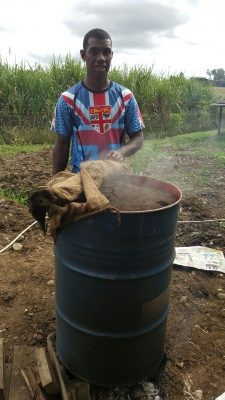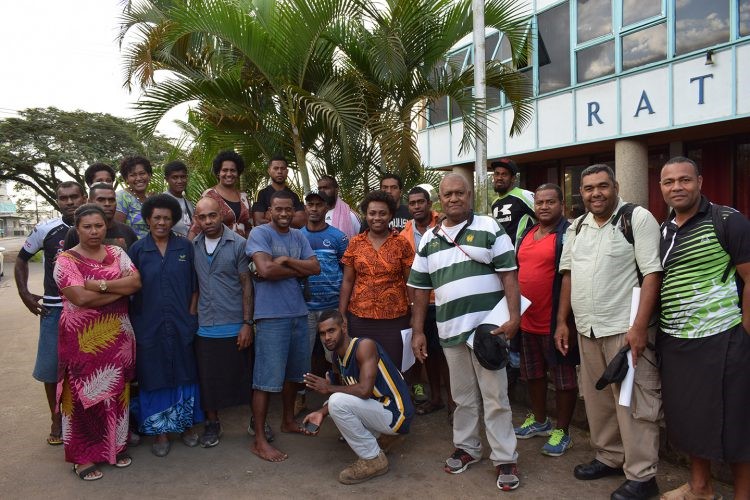Tour experience spells brighter future for youths
In the months that followed, communities, villages and people across the country struggled to pick up the pieces of their shattered lives, among them a group of young people in Tokou Village, Ovalau. Where their farms once flourished with hundreds of kava plants, rootcrops and vegetables – their source of food and income – strong winds had flattened and destroyed them, forcing the young group to uproot what remained and sell it to avoid any waste of the hard work that had gone into tending the farms.
Having realised that working in isolation would only delay their efforts at rebuilding, the group decided to unite and work together, forming the Veivueti Youth Club as a result.
More than a year after the storm, the 12-member club has grown from strength to strength and for the first time since its establishment, members travelled to Viti Levu for a study tour that included training sessions on financial literacy, establishment and management of nurseries including soil sterilisation, seed and planting material selection and adopting mitigation measures during disasters from 21 – 24 June 2017.
The club’s visit was enabled through a meeting in May this year with the Fiji Market Access Working group (MAWG) and members of the group in their village, and collaborations between the Ministry of Agriculture and the Pacific Horticultural and Agricultural Market Access (PHAMA) Program, an initiative of the Australian Government co-funded by the New Zealand Government.
Club president Josua Kabulevu said the visit to the different places of training offered them much-needed guidance and motivated them to work harder and more efficiently.
“After the financial literacy training, we now have a better idea of how to plan and achieve our target. We have all agreed to change our work program and introduce targets that are more precise and timely,” he said.

Youths travelled from Ovalau Island to the main island in Fiji to learn about soil sterilisation and nursery management after natural disasters. Picture: Losalini Leweniqila
Following the visit to the Bula Agro Ltd Nursery owned and run by Sant Kumar in Nadi, Kabulevu said they had learnt new planting techniques which they intended to merge with the traditional farming practices they are used to.
“With the knowledge gained from this tour, we are now looking to establish a semi-commercial nursery farm to grow our own seedlings. We face a challenge in the shortage of planting materials and we’re very grateful for the soil sterilisation and nursery training which Bhapa (Mr Kumar) has taught us about mass production of yaqona (kava) seeds in the nursery,” he said.

Awareness raising and training of farmers is part of PHAMA’s overall strategy to manage market access by developing partnerships between farmers, processors, exporters and government. This will ensure the utilisation of existing market pathways and a consistent production of quality products.
Aside from kava, the club also plants root crops such as dalo, cassava, kumala and vegetables and also operates a kava business and canteen to aid in their development plan to build a house for every member.
“The trip opened a door of opportunity for us to grow as individuals and as a group. Traditional farming combined with nursery techniques that we have learnt will take the club a step further towards individual and club goals,” he said.
Club member Rosalia Bukani said the tour had “exposed them to the possibilities and opportunities” they could pursue.
“We learnt to budget and how to carry on with life even if you’re unemployed. There’s a lot of money we can earn from the resources around us, we only need to know how to use it. I would encourage women who are unemployed and think there’s nothing and no hope – there is hope and you can do something even if you’re just staying at home,” she said.
Ministry of Agriculture’s Extension Officer, Losana Nakato has been assisting the club since its inception and also accompanied the club on the tour.
“What’s different about this club is the initiative they take to make things happen. I’ve facilitated their requests for kava plants and dalo (taro) suckers and on some occasions, they don’t wait for me to supply them with planting materials. They actually go out and buy their own materials,” she said.
She said the club was coping well. “They’re very talented youths and whatever they discuss or decide at their meetings, they’re quick to implement. It’s good to see so much enthusiasm.”
The club members have since returned to Ovalau where they have resumed their work rotation scheme on each other’s farms. Equipped with additional skills and know-how, the much-awaited kava harvest still a few years away is the silver lining they’re looking forward to.
-ENDs-
For further information, contact Losalini Leweniqila at l.leweniqila@phamaplus.com.au or on +679 995 7593
